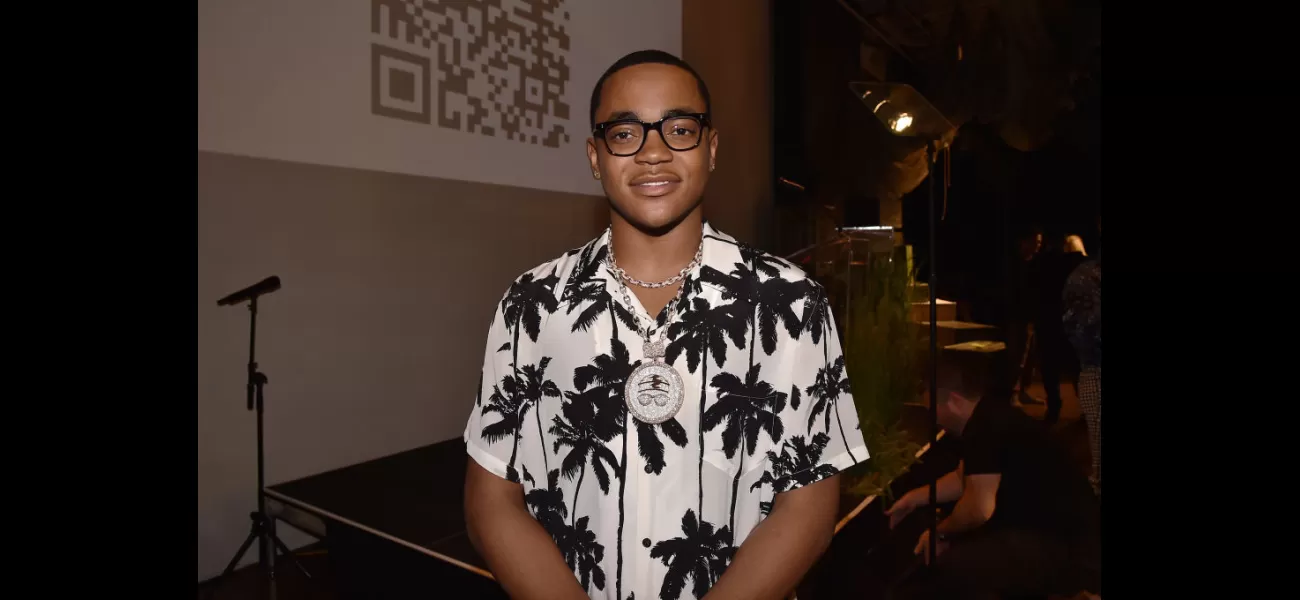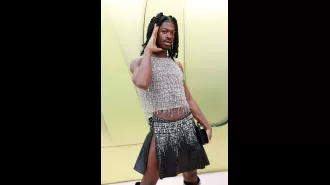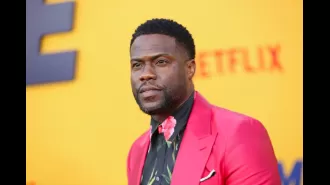Actor Michael Rainey Jr.'s sexual assault accusation highlights the overlooked issue of male victims.
James and Jackson's reactions are a result of men buying into patriarchal falsehoods.
June 15th 2024.

The recent incident involving Power: Book II star Michael Rainey Jr. and allegations of sexual assault by Twitch streamer TyTy James’ sister has sparked a much-needed conversation about how men are often discouraged from coming forward with their own experiences of sexual assault at the hands of women. This uncomfortable truth was brought to light when Rainey appeared on a live stream hosted by James, and his sister joined in, causing Rainey visible distress. It was later revealed that Rainey had been sexually assaulted by James’ sister.
Although the video footage of the incident is not entirely clear, it is evident that Rainey was deeply troubled as he moved to cover himself. In a powerful statement on Instagram, Rainey called out the double standard that society often employs when it comes to male victims of sexual assault. He stated, “At this point, everyone has seen the video circulating online. I am still in shock and don’t fully know how to process what happened last night. This is an unfortunate situation that I do not condone in any way. I can’t take it lightly because I know I would be in serious trouble if the roles were reversed. The fact is, sexual assault is never okay, regardless of gender or status. We’re all human, and we should respect each other. Most importantly, we should always respect ourselves.”
The response to Rainey’s statement was mixed, with some individuals expressing shock and concern, while others seemed to downplay the severity of the situation. Twitch streamer TyTy James initially tried to brush off his sister’s actions and seemed upset that Rainey had left the stream early. However, the next day, James released a statement on Instagram apologizing for his sister’s behavior. He wrote, “After the actions that occurred during my stream last night, I would like to sincerely apologize to Michael and his family for what took place. My little sister was completely wrong and out of line. What she did was very inappropriate and unacceptable. I am truly embarrassed and disgusted by her actions. I completely respect whatever direction Michael wants to go in this situation. After watching the clip, I was completely taken aback by what she did. I will take extreme precautions with future streams to avoid similar issues, and I have banned her from participating in future streams. I do not condone any type of assault.”
However, not everyone responded to the situation with the same level of remorse and accountability. Curtis “50 Cent” Jackson, an executive producer of Power: Book II, made a post on Instagram that suggested he believed men are not capable of being sexually assaulted or taken advantage of. He wrote, “Wait sexual assault from a male perspective? This was an aggressive advance. LOL, he’s fine. No charges are being pressed.” After facing backlash for his insensitive remarks, Jackson made another post addressing the incident. “I registered that as a form of flattery. I have accepted that from female fans my whole career, but OK, right, guys? Put her in jail! Whatever floats your boat,” he wrote.
The reactions from James and Jackson highlight a glaring issue in our society – the toxic effects of patriarchy. Patriarchy not only limits the freedoms of women but also traps men in harmful expectations that discourage them from expressing their feelings or emotions. Under patriarchy, men are often seen as hypersexual beings who are always seeking sexual gratification, and any man who comes forward as a victim of sexual assault is deemed weak or feminine. This societal conditioning makes it challenging for male victims to be taken seriously and receive the support they need.
This is not an isolated incident. According to a 2021 study from the University of South Carolina, there is a lack of research and resources available for male victims of sexual assault, particularly for Black men. The study’s author, Jordyn Livingston, stated, “It is concluded that due to negative associations of race and gender, Black men are not socially perceived as victims; therefore, they are not allowed access to the same safe space to express their victimhood, they are not the focus population when doing research in sexual assault, and they do not have the same access to resources to address their trauma as other groups.”
In his op-ed for NBC News, Mychal Denzel Smith wrote about the experience of an NFL player who had been sexually assaulted on a flight. Smith argued that Black men face an uphill battle to be seen as victims, as society has conditioned us to view Black men as perpetrators of violence. This harmful stereotype perpetuates the idea that Black men are hypersexual and uniquely violent, making it difficult for them to be taken seriously as victims of sexual assault.
It is essential to correct the damaging narrative surrounding Black male sexual assault victims. As men, we have a responsibility to create a safe space for other men to come forward and share their experiences. We must reject the harmful ideas that patriarchy has instilled in us and take the sexual assault of men seriously. Until we do, we will continue to see cases like Rainey's, where male victims are either not believed or publicly supported by other men.
If we want to address critical issues like men's mental health, we must first change the societal perception of male victims. We must create a culture where men can be both strong and vulnerable, and where they can speak out about their experiences without fear of judgment or dismissal. As a community, we must do better to support and protect all victims of sexual assault, regardless of their gender. Only then can we truly have meaningful conversations and make progress towards a more equitable society.
Although the video footage of the incident is not entirely clear, it is evident that Rainey was deeply troubled as he moved to cover himself. In a powerful statement on Instagram, Rainey called out the double standard that society often employs when it comes to male victims of sexual assault. He stated, “At this point, everyone has seen the video circulating online. I am still in shock and don’t fully know how to process what happened last night. This is an unfortunate situation that I do not condone in any way. I can’t take it lightly because I know I would be in serious trouble if the roles were reversed. The fact is, sexual assault is never okay, regardless of gender or status. We’re all human, and we should respect each other. Most importantly, we should always respect ourselves.”
The response to Rainey’s statement was mixed, with some individuals expressing shock and concern, while others seemed to downplay the severity of the situation. Twitch streamer TyTy James initially tried to brush off his sister’s actions and seemed upset that Rainey had left the stream early. However, the next day, James released a statement on Instagram apologizing for his sister’s behavior. He wrote, “After the actions that occurred during my stream last night, I would like to sincerely apologize to Michael and his family for what took place. My little sister was completely wrong and out of line. What she did was very inappropriate and unacceptable. I am truly embarrassed and disgusted by her actions. I completely respect whatever direction Michael wants to go in this situation. After watching the clip, I was completely taken aback by what she did. I will take extreme precautions with future streams to avoid similar issues, and I have banned her from participating in future streams. I do not condone any type of assault.”
However, not everyone responded to the situation with the same level of remorse and accountability. Curtis “50 Cent” Jackson, an executive producer of Power: Book II, made a post on Instagram that suggested he believed men are not capable of being sexually assaulted or taken advantage of. He wrote, “Wait sexual assault from a male perspective? This was an aggressive advance. LOL, he’s fine. No charges are being pressed.” After facing backlash for his insensitive remarks, Jackson made another post addressing the incident. “I registered that as a form of flattery. I have accepted that from female fans my whole career, but OK, right, guys? Put her in jail! Whatever floats your boat,” he wrote.
The reactions from James and Jackson highlight a glaring issue in our society – the toxic effects of patriarchy. Patriarchy not only limits the freedoms of women but also traps men in harmful expectations that discourage them from expressing their feelings or emotions. Under patriarchy, men are often seen as hypersexual beings who are always seeking sexual gratification, and any man who comes forward as a victim of sexual assault is deemed weak or feminine. This societal conditioning makes it challenging for male victims to be taken seriously and receive the support they need.
This is not an isolated incident. According to a 2021 study from the University of South Carolina, there is a lack of research and resources available for male victims of sexual assault, particularly for Black men. The study’s author, Jordyn Livingston, stated, “It is concluded that due to negative associations of race and gender, Black men are not socially perceived as victims; therefore, they are not allowed access to the same safe space to express their victimhood, they are not the focus population when doing research in sexual assault, and they do not have the same access to resources to address their trauma as other groups.”
In his op-ed for NBC News, Mychal Denzel Smith wrote about the experience of an NFL player who had been sexually assaulted on a flight. Smith argued that Black men face an uphill battle to be seen as victims, as society has conditioned us to view Black men as perpetrators of violence. This harmful stereotype perpetuates the idea that Black men are hypersexual and uniquely violent, making it difficult for them to be taken seriously as victims of sexual assault.
It is essential to correct the damaging narrative surrounding Black male sexual assault victims. As men, we have a responsibility to create a safe space for other men to come forward and share their experiences. We must reject the harmful ideas that patriarchy has instilled in us and take the sexual assault of men seriously. Until we do, we will continue to see cases like Rainey's, where male victims are either not believed or publicly supported by other men.
If we want to address critical issues like men's mental health, we must first change the societal perception of male victims. We must create a culture where men can be both strong and vulnerable, and where they can speak out about their experiences without fear of judgment or dismissal. As a community, we must do better to support and protect all victims of sexual assault, regardless of their gender. Only then can we truly have meaningful conversations and make progress towards a more equitable society.
[This article has been trending online recently and has been generated with AI. Your feed is customized.]
[Generative AI is experimental.]
0
0
Submit Comment





